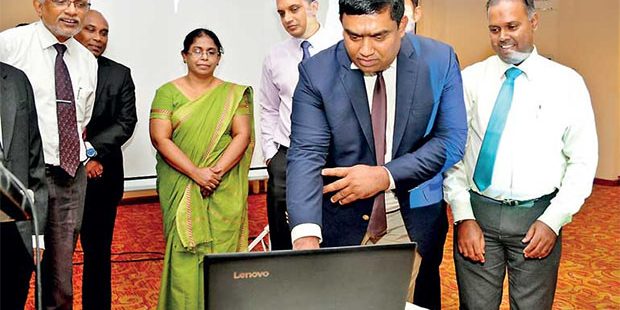Turning a new page in Sri Lanka’s e-Government and business history, the Department of Registrar of Companies yesterday (2 April) launched the first phase of an automated real-time company registration process, with the aim providing more efficient and effective service, while enhancing revenue collection opportunities of the Government.
This was the first time the company registration process in Sri Lanka, which has been practiced manually for 80 long years, has upgraded to an online and electronic platform on par with international standards, with an investment of Rs.57 million.
The digital platform ‘e-ROC’,implemented under the supervision of Industry and Commerce Ministry, will provide name approval service and company incorporation servicein the first phase, whereas in the second phase, the Department expects the online services will be extended to company closures, providing public access to local company information, and issuance of certified information. The system is expected to go online completely by August.
ICTA is the project management and technical consultant of e-ROC, while KPMG is the vendor through which software development collaborations with informatics companies were performed.
Industry and Commerce Ministry Secretary Ranjith Asoka said in 2017 the Department performed 9,782 new company incorporations, an increase of 18% compared to 2016, while 208,710 document registrations were performed in 2017, an increase of 3% compared to 2016.
Additionally, 84 new societies, 817 Secretaries and 19,275 public contract agreements were registered.
Last year, the Department recorded Rs.792 million in revenues and another Rs.400 million in its company fund.
Considering the large amount of documents involved in these procedures, Asoka noted that, going forward, the e-ROC will help the Government institutions to go paperless.
Giving an introduction to the e-ROC, ICTA Special Projects Director Kanchana Thudugala said the key objectives were to provide more effective and efficient service, support revenue collection opportunities of the Department, and to improve the Ease of Doing Business Index of Sri Lanka.
Noting that at present, it takes nine days and seven procedures to get a business registered, Thudugala said that with the completion of the system they intend to reduce the number of procedures, and reduce the number of days to one, to improve Sri Lanka’s Ease of Doing Business Index ranking to 70th position by 2020.
Telecommunication and Digital Infrastructure Ministry Secretary Wasantha Deshapriya emphasised the fact that lack of e-leadership capacity has become a hindrance in developing systems in Sri Lanka. Although the Inland Revenue Department and the Employees Provident Fund (EPF) were to be integrated with the e-ROC yesterday (2 April), he said the Department of Registrar of Companies was yet to achieve that.
“Our tax system has come online to some extent, but not fully. Even though the EPF system has been there for over a decade, they have operated as closed systems. Not believing in open standards and open systems, not believing in sharing data to facilitate system and business interaction. Even if the Government intends to fast-track and implement systems, because of the slowness in the backend systems, it hinders the pace. This is a major roadblock for the advancement in e-Government in Sri Lanka,” he added.
Deshapriya called on the Registrar of Companiesand Industry and Commerce Secretary Ranjith Asoka to have a changed management process installed in the organisations, to work towards a competent framework. “This digital transformation cannot be led by an individual. It is not a task that can be achieved by one or two individuals. It is mandatory for the entire organisation to embrace the digital transformation and be literate, be versatile in the next step. The technologies are changing on a daily basis and it is difficult for the Government to keep up with the pace. We need to be on the ball, be ready. I think the organisation has to undergo a drastic change to take e-leadership,” he pointed out.
He stressed that having a system which can run at 100mph with a backend system that is stagnant will only slow down the entire system. “The first part is like a stallion which is running a race at 100mph, but the second part is like a cow which is only good for milking. So, this combination cannot be successful,” he stressed.
He asserted that the Department will also need to use e-signatures to ensure security as well as the digital identity of the key members of the organisation going forward, but to achieve that level they would have to make drastic changes in the organisation structure.
KPMG Partner C.P. Jayathilake said the main aim was to provide a 24×7 uninterrupted service to businesses with the minimum human intervention.He expressed his belief that the completion of the full system would help business to take timely action and quality decisions, while it would also improve accountability as well as Government revenue.



